最新PEP英语五年级上册重点单词和句子
pep小学五年级英语上册知识点汇总(已整理)

五年级上册知识汇总Unit 1一.单词:young年轻的funny滑稽可笑的tall高的 strong强壮的kind和蔼的,亲切的old年老的 short矮的 thin瘦的who’s = who is Mr先生like像、喜欢what’s = what is he’s = he is principal校长 university student大学生strict 严格的smart聪明的、巧妙的active积极的、活跃的very 很、非常but但是quiet安静的;文静的she’s = she is二. 句子:1.A:Who’s your English teacher ? 你的英语老师是谁?B:Mr Carter. 卡特先生.2. He’s from Canada. 他来自加拿大.3. A:What’s he like ? 他什么样?B: He’s tall and strong . 他又高又壮.He’s very funny. 他很滑稽.〔Who,What引导的特殊疑问句,用来对不熟悉的老师进行问答:Who's + 某人?What's he / she like? He / She is + 与身体特征和性格特征有关的形容词.)4.A: Who’s that young lady/? 那个年轻的女士是谁?B:She’s our principal.她是我们的校长.5.I have a new math teacher. 我有一位新数学老师.6.Her class is so much fun. 她的课非常有趣.7.She’s a university student. 她是一名大学生.8. A: Is she quiet ? 她很安静吗?B: No, she isn’t. She’s very active. 不是的.她很活跃的.〔Is引导的一般疑问句,谈论某位老师是否具有某方面的特征:Is he / she + 与身体特征和性格特征有关的形容词,回答用:Yes, he / she is. No, he / she isn't. )9. A:Is she strict ? 她很严格么?B:Yes, she is , but she’s very kind . 是的,但她很和蔼的.三. 语法:1、动词的第三人称单数:〔当一个句子中的人物是第三人称单数,并且这个句子又是一般现在时态时,该句子中的动词要使用第三人称单数形式.〕have—has like—likes do—does go—goes watch--watches2、词语变化:fun(形容词形式)――funny funny〔名词形式〕――funknow(同音词)――no反义词:tall—short long—short young—old strong—thinactive—quiet kind—strict active—quiet3、be like与do like: 在本单元中,What’s …like?的句型是主句型,这里的like 是“像…一样”的意思. What’s …like?是问某某长得什么样子.它的答语一般用:He/She/ It is…(后面跟描写人的外貌特征的词语),如:What’s your father like?你爸爸长得什么样子?.而在do like的句子中,like的意思才是“喜欢”的意思.如:What does your father like? 你爸爸喜欢什么?4 Mr—先生Miss —小姐〔未婚〕Mrs—夫人,女士〔已婚〕四.语音:字母组合:ea peach tea seat jeans字母组合:ee beef sheep queen sleepUnit2一.单词:Monday〔Mon.)星期一Tuesday〔Tue.) 星期二 Wednesday(Wed.) 星期三Thursday〔Thu.) 星期四Friday〔Fri.) 星期五 day天;日子have有;吃on 在……时候do homework做作业watch TV 看电视 read books读书 Saturday〔Sat.)星期六Sunday〔Sun.)星期日What about…?……怎么样?too也;太二.句子:1 A: What day is it today ? 今天星期几?B: It’s Wednesday. 星期三.2. A: What do you have on Thursdays ? 星期四你们有什么课?B: We have English, math and science on Thursdays.在星期四我们有英语,数学和科学课.3. I like Thursdays. 我喜欢星期四.4.A:What do you do on Saturdays ? 星期六你常常做什么?B: I often do homework, read books and watch TV.我经常做作业,读书,看电视.5. A: What about you ? /And you? 你怎么样?/你呢?B: I do my homework, too. 我也做作业.三. 语法:1、当介词in, on ,at 后面跟表示时间的词语时,表示在某年或某月〔当只有年和月的时候〕,用in.如in May在五月.In 1988,在1988年.表示在某段时间,如在上午,下午,晚上也用in.如in the morning, in the afternoon, in the evening. 表示在某日,在星期几时,用on.如on Monday, on Sunday . 表示在几点几分,在具体时间时,用at. 如at 6:30, at 9 o’clock.2. I like Mondays. John likes Sundays. 这里的likes是like的第三人称单数形式,在一般现在时的句子中,如果主语是第三人称单数,注意动词要变成三单形式.3、理解、区分这两个句型A: What do you have on Mondays?〔每逢周一你们都有什么课?)B: We have Chinese, English, math and science on Mondays.A: What do you do on Mondays? 〔每逢周一你都做什么?)B: I often do homework, read books and watch TV.四.语音:字母组合:ow how town brown now字母组合:ou our mouth mountain houseUnit3一.单词:cabbage洋白菜;卷心菜pork 猪肉mutton羊肉eggplant茄子fish 鱼green beans青豆tofu 豆腐potato土豆tomato西红柿for为;给 lunch中餐we我们healthy健康的;有益健康的tasty好吃的sweet甜的sour酸的fresh新鲜的salty 咸的 favourite最喜欢的they’re = they are fruit水果grape葡萄don’t = do not 不;非第三人称单数的否定形式二.句子:1.A: What would you like for lunch? 午饭你想吃什么?B: I’d like some tomatoes and mutton.我想吃西红柿和羊肉.2. A: What do you have for lunch on Mondays?星期一你们午饭吃什么?B: We have tomatoes,tofu and fish.我们吃西红柿,豆腐和鱼.3.A: What’s your favourite food? 你最喜欢的食物是什么?B: Fish. 鱼.4.A: What’s your favourite fruit ? 你最喜欢的水果是什么?B: I like apples . They are sweet. 我喜欢苹果. 它们是甜的.I like fruits. But I don’t like grapes. They’re sour.我喜欢水果. 但是我不喜欢葡萄. 它们是酸的.三. 语法:1、I have eggplant and tomatoes for lunch. 我午饭吃茄子和西红柿.这里的eggplant是指一道菜,是被切碎了的,熟的,所以这里的eggplant是不可数名词,不能用复数形式.西红柿tomato 和土豆potato 复数形式在后面加es tomatoes, potatoes fish 当表示为活的鱼的时候,是可数的,但它是单复数同形;当表示为鱼肉的时候,是不可数的.cabbage 当表示是一种包菜的数量时,是不可数名词,表示为cabbage;当表示不同种类的包菜时,是可数名词,表示为cabbageseggplant 当表示是未经过烹饪的蔬菜时,是可数名词,表示为eggplants;当表示经烹饪过的菜肴时,是不可数名词,表示为eggplant常见的肉类为不可数名词,pork mutton beef等2. 下列单词的形容词形式:health---healthy〔健康的〕taste---tasty〔好吃的〕3.What’ s y our favorite food? 后面一般都跟集合的名词:food 食物fruit水果drink饮料colour颜色class 课程book 书sport 运动vegetable 蔬菜number数字day天四.语音:字母组合:ow window yellow snow grow字母组合:oa coat boat goat roadUnit4一.单词:empty the trash倒垃圾cook the meals 做饭water the flowers浇花sweep the floor扫地clean the bedroom打扫卧室make the bed铺床set the table摆餐具wash the clothes洗衣服do the dishes洗碗碟put away the clothes收拾衣服can’t = cannot〔不会;不能〕use a computer〔使用计算机〕二.句子:1. I’m helpful! I can sweep the floor.我是有用的!我能扫地.2. A:Are you helpful at home?你在家有用吗?B: Sure. 当然.3.A: What can you do ? 你会干什么?B: I can sweep the floor.我会扫地.4. A: Can you do housework? 你能会家务吗?B: Yes I can.是的,我会No, I can't.不,我不会.5. A: Can you wash the clothes?你会洗衣服吗?B: No, I can't, but I'd like to have a try. 不,我不会,但我想试一试.6.A: Can you make the bed ? 你会铺床吗?B: No,I can’t. 不,我不会.7.A: Can you use a computer ? 你会使用计算机吗?B: Yes, I can. 是的,我会.三. 语法:1、当你想询问别人会干什么时,用What can you do? 答句有肯定形式:Yes, I can . 否定形式:No, I can’t.当你想知道他人会干什么时,可用What can he do ? 或者What can she do ? 答句有肯定形式:Yes, he can ./ Yes, she can. 否定形式:No, he can’t./No, she can’t.2、I can …变为一般疑问句:Can you …? He can…或She can …变为一般疑问句:Can he …/ Can she …? 其中的he , she 也可以变为其他具体的人物.如My mother can cook the meals. 变为一般疑问句:Can your mother cook the meals?3、help〔形容词形式)――helpful helpful〔动词形式)――help4、当句子中出现了情态动词can或其否定形式can’t时,其他的动词要用原形. 四.语音:or short fork horse stormall tall small ball hallUnit 5一.单词:air-conditioner空调curtain窗帘trash bin垃圾箱closet壁橱;衣橱mirror 镜子end table床头柜bedroom卧室kitchen厨房bathroom卫生间living room客厅;起居室in在…里面on在…上面接under在…下面 near在..旁边behind在…后边over在……上方in front of在……前面clothes 衣服二.句子:1.A: Is this your bedroom? 这是你的卧室吗?B: Yes, it is. 是的,它是.2.I have my own room now.现在我有自己的房间了.3.A:What’s it like? 它什么样?B:There is a mirror, a bed and a big closet.这里有一面镜子,一张床和一个大衣橱.〔There be句型,某地有某物:There is / are + 家具)4.There are two bedrooms, a kitchen,a bathroom and a living room.这里有两间卧室,一间厨房,一间卫生间和一间客厅.5.A: Where is the trash bin? 垃圾箱在哪?B:It's near the table. 它在桌子旁边.6.There are two end tables near the bed. 床边有两个床头柜.7. The closet is near the table.衣橱在桌子旁边.8. Many clothes are in the closet. 许多衣服在衣橱里.9. The trash bin is behind the door. 垃圾箱在门后.三.语法:1、There be 句型包括单数形式的There is a/an …句型和复数形式的there are …句型.There is a/an …句型表示有一个,后面跟名词单数.There are …句型表示有多个,后面一般接具体数字或some , many,再后面跟名词复数.There be 句型又叫“存在”句型,它一般表示在某地有某物.2、There be 句型中使用单数句式还是复数句式遵循就近原则.3、on 与over的区别:on在…上面.表示与下面的物体互相接触,紧挨着. over在…上面,表示与下面的物体不接触,两个物体之间有一定的距离.四.语音:ir skirt shirt girl birthdayur nurse purple hamburger furUnit6 :一.单词:sky天空cloud云mountain 山;山脉river河流flower花grass草lake湖泊 forest森林path 路;小道 park公园picture照片village乡村;村庄city 城市house房子bridge桥 tree树road公路building建筑物 clean干净的二.句子:1.There is a forest in the nature park.在自然公园里有一个森林.2.A: Is there a forest in the park? 公园里面有一个森林吗?B: Yes, there is. 是的,有.(There be句型的一般疑问句:--- Is / Are there + 某物+ 某地?回答:Yes, there is / are. No, there isn't / aren't. )3.A: Is there a river? 有一条河吗?B: No, there isn’t.不,没有.4.There are many small houses in my village.在我的村庄里有许多小房子.5.A:Are there any pandas in the mountains? 山里有熊猫吗?B: No,there aren’t. 不,没有.6.A: Are there any fish in the river? 河里有鱼吗?B : Yes, there are. 是的,有.三. 语法:1、There be 的单数形式在变为一般疑问句时,将助动词be提前,与there交换位置,如句中有第一人称代词,变为第二人称,将句末的句号变为问号,其他不变.There be 的复数形式在变为一般疑问句时,将助动词be提前,与there交换位置,然后将句中some或many变为any, 如句中有第一人称代词,变为第二人称,再将句末的句号变为问号,其他不变.2、There be 句型表示“有”和have, has表示“有”的区别There be句型表示“有”的意思,表示在某个地方有什么,它表示的一种存在.如:There is a bag on the desk. 有一个书包在课桌上.There are many books on the desk. 有许多书在课桌上.Have, has 表示“有”的意思,表示一种占有,拥有的关系,一般表示某人有某物.当主语人称是第三人称单数时用has, 其他时候用have.如:I have a new pen. 我有一支新钢笔.He has a big schoolbag. 他有一个大书包.3.人称代词和物主代词er teacher river farmer dinner or doctor actor visitor author。
专项--重点句子(知识清单)人教PEP版英语五年级上册
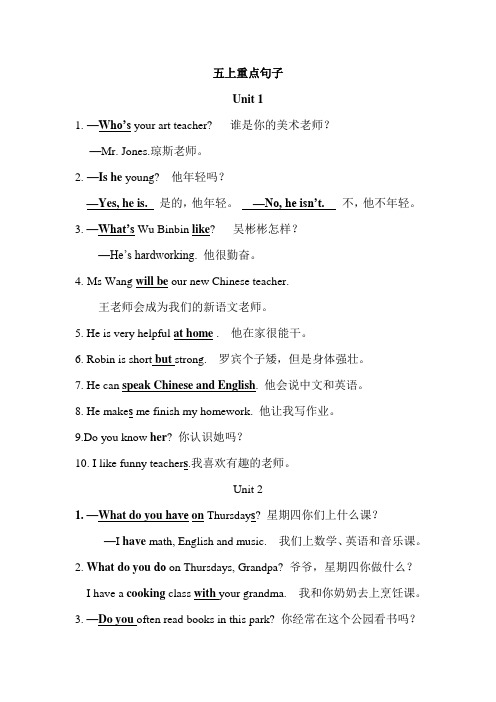
五上重点句子Unit 11.—Who’s your art teacher? 谁是你的美术老师?—Mr. Jones.琼斯老师。
2.—Is he young? 他年轻吗?—Yes, he is. 是的,他年轻。
—No, he isn’t. 不,他不年轻。
3. —What’s Wu Binbin like? 吴彬彬怎样?—He’s hardworking. 他很勤奋。
4.Ms Wang will be our new Chinese teacher.王老师会成为我们的新语文老师。
5. He is very helpful at home . 他在家很能干。
6. Robin is short but strong. 罗宾个子矮,但是身体强壮。
7. He can speak Chinese and English. 他会说中文和英语。
8. He make s me finish my homework. 他让我写作业。
9.Do you know her? 你认识她吗?10. I like funny teacher s.我喜欢有趣的老师。
Unit 21. —What do you have on Thursday s? 星期四你们上什么课?—I have math, English and music. 我们上数学、英语和音乐课。
2. What do you do on Thursdays, Grandpa? 爷爷,星期四你做什么?I have a cooking class with your grandma. 我和你奶奶去上烹饪课。
3. —Do you often read books in this park? 你经常在这个公园看书吗?—Yes, I do.是的—No, I don’t.不是4. Look at my picture. 看我的图片。
5. You look tired. 你看起来很累。
人教版PEP英语五年级上册第一单元单词及重点句型-全
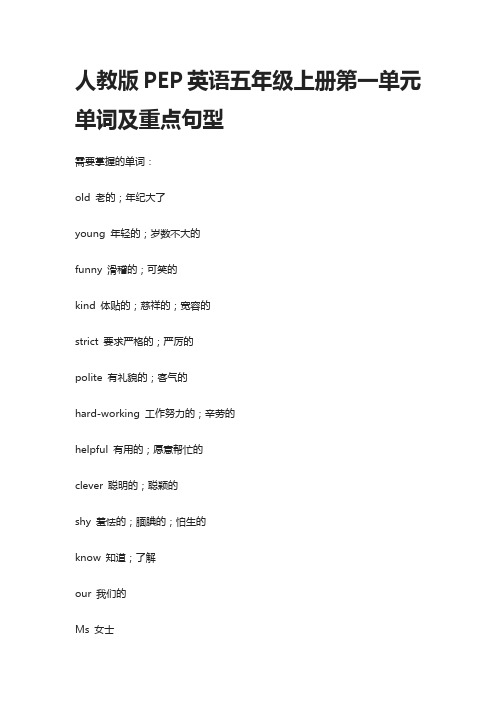
人教版PEP英语五年级上册第一单元单词及重点句型需要掌握的单词:old 老的;年纪大了young 年轻的;岁数不大的funny 滑稽的;可笑的kind 体贴的;慈祥的;宽容的strict 要求严格的;严厉的polite 有礼貌的;客气的hard-working 工作努力的;辛劳的helpful 有用的;愿意帮忙的clever 聪明的;聪颖的shy 羞怯的;腼腆的;怕生的know 知道;了解our 我们的Ms 女士will 将要sometimes 有时,间或robot 机器人him 他speak 会说;会讲(某种语言);用(某种语言)说话finish 完成;做好单元知识点一、核心词汇1.表示人体貌特征及性格特点的形容词: old老的;年纪大的young年轻的;岁数不大的funny 滑稽的;可笑的kind 体贴的;慈祥的;宽容的strict 要求严格的;严厉的polite有礼貌的;客气的hard-working 工作努力的;辛勤的helpful 有用的;愿意帮忙的clever 聪明的;聪颖的shy 羞怯的;腼腆的;怕生的2.短语: head teacher校长birthday party生日派对二、了解词汇1. 单词: know知道;了解our我们的Ms (用于女子的姓氏或姓名前,不指明婚否)女士will(谈及将来)将要sometimes 有时;间或robot机器人him(用作宾语或表语)他speak会说;会讲(某种语言);用(某种语言)说话finish 完成;做好2.短语: be strict with …对……要求严格be going to打算三、核心句型1. —Who’s your English teacher?谁是你们的英语老师?—Miss White.怀特老师。
解读:这是询问某个学科的老师是谁的句型及回答。
2. —What’s she like?她什么样?—She’s kind.她很和蔼。
pep五年级英语上册重点单词和句型

pep五年级英语上册重点单词和句型Unit 1 My New Teacher 重点单词和句型 1. --- Who's your Chinese teacher? --- Mr Xiao. 2. --- What's he like? --- He's tall and thin. He's very strict, but he's very funny. 3. --- Is he tall? --- Yes, he is. --- Is he strong? --- No, he isn't. 4. --- Who's your English teacher? --- Miss Li. 5. --- What's she like? --- She's short and thin. She's young. She's kind. 6. --- Is she thin? --- Yes, she is. --- Is she strong? --- No, she isn't. Unit 2 My Days of the Week 重点单词和句型 1. --- What day is it today? --- It's Monday. 2. --- What do you have on Mondays? --- We have Chinese, English, Math and Music. 3. --- What do you do on Saturdays? --- I do my homework. --- What about you? --- I do my homework, too.Unit 3 What's Your Favourite Food? 重点单词和句型 1. --- What do you have for lunch on Mondays? --- We have tomatoes, tofu and fish. 2. --- What's your favourite food? --- Fish. 3. --- What's your favourite fruit? --- I like apples. They're sweet. --- I like fruit. But I don't like grapes. They're sour. Unit 4 What Can You Do? 重点单词和句型 1. --- What can you do? --- I can sweep the floor. 2. --- Can you make the bed? --- No, I can't. --- Can you use a computer? ---Yes, I can. Unit 5 My New Room 重点单词和句型 1. --- What's your room like? --- There is a closet, a shelf, a desk and a bed. 2. --- What's in your flat? --- There are two bedrooms, a kitchen, a bathroom and a living room. 3. --- Where is the closet? --- The closet is near the table. --- Where is the trash bin? --- The trash bin is behind the door. 4. Many clothes are in the closet.Unit 6 In a Nature Park 重点单词和句型 1. --- Is there a forest in the park? --- Yes, there is. --- Is there a river? --- No, there isn't. 2. --- Are there any pandas in the mountain? ---No, there aren't. --- Are there any fish in the rivers? --- Yes, there are.五年级上册句型总揽 Unit 1 My New Teachers 话题:校园生活时态:一般现在时句型: 1. Who,What引导的特殊疑问句,用来对不熟悉的老师进行问答:Who's + 某人?What's he / she like? He / She is + 与身体特征和性格特征有关的形容词。
五年级上册单词及重点句子pep版本

Unit1 My New Teachers句型:This is our new science teacher.Do you have new teachers?Yes, We have a new art teacher.What’s he like? He’s tall and thin .Who’s your art teacher?Mr Hu.必会:young 年轻的funny 滑稽可笑的tall 高的strong 强壮的kind 和蔼的;亲切的old 老的short 矮的thin 瘦的who’s=who is Mr 先生what’s=what is like 像;喜欢he’s=he is strict 严格的smart 聪明的;巧妙的active 积极的;活跃的quiet 安静的;文静的she’s=she is very 很;非常but 但是principal 校长university student 大学生from 从;来自Canada 加拿大know 知道Miss 小姐lady 女士;小姐;夫人so much 很;非常fun 有趣;逗笑Unit2 My Days of the Week句型:What day is it today? It’s Monday.What do we have on Mondays? We have English , math and PE.What do you do on Saturdays?I watch TV ,do my homework and read books.必会:Monday (Mon.)星期一Tuesday (Tue.)星期二Wednesday(Wed.)星期三Thursday(Thu.)星期四Friday(Fri.) 星期五day 天;日子have 有;吃on 在…时候do homework 做作业watch TV 看电视read books 读书Saturday(Sat.) 星期六Sunday(Sun.) 星期日What about…? …怎么样too 也;太Moral Education 思想品德课Social Studies 社会课wait 等等;等待tomorrow 明天often 常常;经常love 爱;热爱yeah 是;行play computer games 玩电脑游戏do housework 做家务Unit3 What’s Your Favourite Food句型:What’s your favourite food? Mutton.What do you have for lunch today? I have eggplant.It’s tasty.I don’t like grapes .They’re sour.I like grapes. They’re fresh.The beef is too salty. I don’t like it.必会:eggplant 茄子fish 鱼green beans 青豆tofu 豆腐potato 土豆tomato 西红柿for 为;给lunch 中餐;午饭we 我们tasty 好吃的;可口的sweet 甜的sour 酸的fresh 新鲜的salty 咸的favourite 最喜爱的;特别喜爱的they’s=they arefruit 水果don’t=do not grape 葡萄cabbage 洋白菜;卷心菜pork 猪肉mutton 羊肉healthy 健康的;有益健康的I’d like=I would like menu 菜单sound 听起来Mew Mew 猫咪;咪咪now 现在have to 不得不eat 吃Unit4 What Can You Do?Can you clean the bedroom?No , I can’t ,but robot can.What can you do at home?I can clean the bedroom. I can cook the meals. I can wash the clothes. cook the meals 做饭water the flowers 浇花sweep the floor 扫地clean the bedroom 打扫卧室make the bed 铺床set the table 摆饭桌;摆餐具wash the clothes 洗衣服do the dishes 洗碗碟can’t=cannot use a computer 使用计算机empty the trashUnit5 My New Room句型:This is my new bedroom.There is a doll on the bed.There are many story-books on the shelf.There iscurtain 窗帘trash bin 垃圾箱closet 壁橱;衣橱mirror 镜子end table 床头柜bedroom 卧室kitchen 厨房bathroom 卫生间living room 客厅;起居室in 在……里面on 在……上面under 在……下面near 在……旁边behind 在……后边clothes 衣服Unit6 In a Nature Parkriver 河流flower 花grass 草lake 湖泊forest 森林path 路;小道park 公园picture 照片house 房子;住宅bridge 桥tree 树road 公路;大道building 建筑物clean 干净的。
PEP小学英语五年级上册单词+短语+四会句型+重点语法整理(表格版)
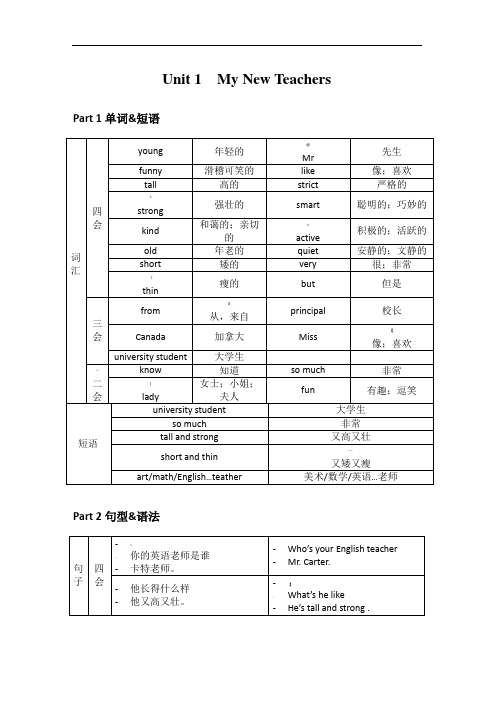
星期一 星期二 星期三
星期四 星期五 星期六 星期日
天;日子
have on
do homework
!
watch TV read books What about…
too
|
有;吃 在…时候 做作业
看电视 读书 …怎么样 也;太
三 会
[
二 会
短语
wait
等等;等待
yeah Moral Education
~
下列单词的形容词形式: salty---salty(咸的) health---healthy(健康的) taste---tasty(好吃 的)
【some & any】 1)some 用于肯定句。但当表示请求、邀请、语气委婉,希望对方得 到对方肯定回答时,可用于疑问句,此时句中常出现情态动词 can, may, could, would. any 用于否定句和疑问句。
描写人的外貌特征的词
如:- What’s your father like 你爸爸长得什么样子
- He is very strong.
]
而在 do like 的句子中,like 的意思是“喜欢”的意思。 如:- What does your father like 你爸爸喜欢什么
- He likes apples. 名词复数
今天是星期几
-— - It’s +表示星期几的词. 星期…
2.询问某一天课程的句型及答语 - What do you have on +表示星期几的词的复数形式
星期…你们有什么课 - We have +课程名称. 我们有…课。
3.询问某一天所做事情的句型及答语
-) - What do you do on +表示星期几的词的复数形式
PEP小学英语五年级上册重点单词和句子(汇编)

Unit 11、告诉朋友我有新换的老师:I have three new teachers. 我有三位新老师。
I have a new math teacher. 我有一位新数学老师。
2、询问陌生人:—Who are they?他们是谁?—A science teacher, an art teacher and an English teacher.一位科学老师,一位美术老师和一位英语老师。
—Who’s that young lady? 那位年轻的女士是谁?—She’s our principal. 她是我们的校长。
3、询问任课教师是谁:—Who’s your art teacher? 你的美术老师是谁?—Mr Hu. 胡先生。
—Who’s your m ath teacher? 你的数学老师是谁?—Mr Zhao. 赵先生。
—Who’s your English teacher? 你的英语老师是谁?—Mr Carter. 卡特先生。
—Who’s your principal? 你们的校长是谁?—Miss Lin. 林小姐。
4、询问任课教师的体貌特征及性格特点,并作出回答:—What’s he like? 他长得什么样?—He’s tall and strong. 他长得又高又壮。
—He’s thin and short. He’s very kind. 他长得又瘦又矮。
他很和蔼可亲。
—Is she quiet? 她很文静吗?—No, she isn’t. She’s very active. 不,不是的。
她很活跃。
—Is she strict? 她很严格吗?—Yes, she is, but she’s very kind.是的,她是,但是她也很和Unit 2询问今天是星期几?1、What day is it today? It's Wednesday.在星期几,你有什么课?2、What do you have on Thursdays?我们有……3、We have English, math and science on Thursdays.在星期几,你做什么?4、What do you do on Saturdays?我做……5、I watch TV on Saturdays.那你呢?6、What about you? I do my homework, too.明天星期几?7、What day is tomorrow? Tomorrow is Thursday.是时候该做某事了。
五年级上册英语单词表和句子

五年级上册英语单词表和句子人教版五年级上册英语单词表。
Unit 1.- old [əʊld] adj.(形容词)老的;年纪大的。
- young [jʌŋ] adj.年轻的;岁数不大的。
- funny ['fʌni] adj.滑稽的;可笑的。
- kind [kaɪnd] adj.体贴的;慈祥的;宽容的。
- strict [strɪkt] adj.要求严格的;严厉的。
- polite [pə'laɪt] adj.有礼貌的;客气的。
- hard - working [hɑː d 'wɜːkɪŋ] adj.工作努力的;辛勤的。
- helpful ['helpfl] adj.有用的;愿意帮忙的。
- clever ['klevə(r)] adj.聪明的;聪颖的。
- shy [ʃaɪ] adj.羞怯的;腼腆的;怕生的。
Unit 2.- Monday ['mʌndeɪ] n.(名词)星期一。
- Tuesday ['tjuːzdeɪ] n.星期二。
- Wednesday ['wenzdeɪ] n.星期三。
- Thursday ['θɜːzdeɪ] n.星期四。
- Friday ['fraɪdeɪ] n.星期五。
- Saturday ['sætədeɪ] n.星期六。
- Sunday ['sʌndeɪ] n.星期日。
- weekend [ˌwiːkˈend] n.周末。
- wash [wɒʃ] v.(动词)洗。
- wash my clothes 洗我的衣服。
- watch [wɒtʃ] v.看。
- watch TV 看电视。
- do [duː] v.做;干。
- do homework 做作业。
- read [riːd] v.看;读。
- read books 看书。
- play [pleɪ] v.踢;玩;参加(体育运动)- play football 踢足球。
五年级上册英语pep版,所有单词句子(二)

五年级上册英语pep版,所有单词句子(二)经典句子集锦:五年级上册英语PEP版一、单词句子1. Unit 1 - Greetings and Introduction•Hello, my name is Peter.•Nice to meet you!•How are you?•I’m fine, thank you.•What’s your name?•Where are you from?2. Unit 2 - My School•This is my classroom.•We have English class on Mondays.•My favorite subject is Math.•Our school library is big.•The playground is behind the school.•I have two best friends.3. Unit 3 - My Family•This is my father.•I have one sister and one brother. •My mom is a doctor.•We like to go to the park together. •I love my family very much.•We live in a big house.4. Unit 4 - My Day•I usually get up at 7 o’clock.•I have breakfast at 7:30.•We have Chinese class in the morning. •I have lunch at 12 o’clock.•In the afternoon, we have PE class. •I go to bed at 9 o’clock.5. Unit 5 - My Body•I have two eyes and one nose.•My ears are big.•I can run fast with my legs. •I use my hands to write. •My mouth helps me eat.•I take care of my teeth.6. Unit 6 - Shapes and Colors•This shape is a triangle. •The sky is blue.•The sun is yellow.•The grass is green.•The flowers are red and pink. •Can you see the rainbow?7. Unit 7 - Animals•I have a pet cat.•The dog can run very fast. •The bird can fly in the sky. •The fish lives in the water. •The monkey climbs trees.•I like animals.8. Unit 8 - Food and Drinks•I like to eat hamburgers.•I drink milk every day.•I have orange juice for breakfast. •Let’s have some fruit salad.•Can I have some ice cream?•I like Chinese food.9. Unit 9 - Clothes•I wear a T-shirt and shorts. •The girl has a beautiful dress.•I need to wear a hat in the sun. •The boy wears a pair of sneakers. •My mom bought me a new coat.•We all have clothes to wear.10. Unit 10 - Weather•It’s sunny today.•The sky is clear.•There are white clouds in the sky.•It’s raining outside.•The wind is blowing.•It’s snowing in winter.二、总结以上是五年级上册英语PEP版的一些经典句子集锦,涵盖了各个单元的常用单词和句子。
PEP小学英语五年级上册单词和重点句子
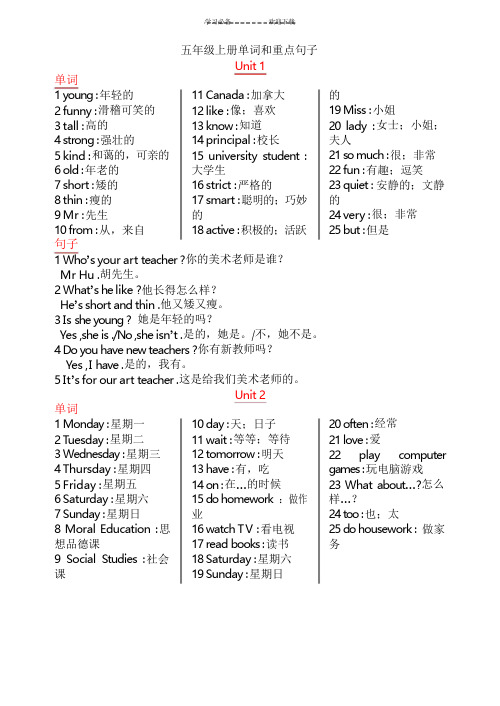
学习必备欢迎下载五年级上册单词和重点句子Unit1单词1young:年轻的11Canada:加拿大2funny:滑稽可笑的12like:像;喜欢3tall:高的13know:知道4strong:强壮的14principal:校长5kind:和蔼的,可亲的15university student:6old:年老的大学生7short:矮的16strict:严格的8thin:瘦的17smart:聪明的;巧妙9Mr:先生的10from:从,来自18active:积极的;活跃句子1Who’s your art teacher?你的美术老师是谁?Mr Hu.胡先生。
2What’s he like?他长得怎么样?He’s short and thin.他又矮又瘦。
3Is she young?她是年轻的吗?Yes,she is./No,she isn’t.是的,她是。
/不,她不是。
4Do you have new teachers?你有新教师吗?Yes,I have.是的,我有。
5It’s for our art teacher.这是给我们美术老师的。
Unit2单词1Monday:星期一10day:天;日子2T uesday:星期二11wait:等等;等待3Wednesday:星期三12tomorrow:明天4Thursday:星期四13have:有,吃5Friday:星期五14on:在…的时候6Saturday:星期六15do homework:做作7Sunday:星期日业8Moral Education:思16watch TV:看电视想品德课17read books:读书9Social Studies:社会18Saturday:星期六课19Sunday:星期日的19Miss:小姐20lady:女士;小姐;夫人21so much:很;非常22fun:有趣;逗笑23quiet:安静的;文静的24very:很;非常25but:但是20often:经常21love:爱22play computer games:玩电脑游戏23What about…?怎么样…?24too:也;太25do housework:做家务学习必备欢迎下载句子1What day is it today?几天星期几?It’s Monday.星期一2What do you have on Mondays?星期一你们有什么课?We have English,science and computer.我们有英语课,科学课和计算机课。
PEP小学英语五年级上册第二单元复习要点(单词句子知识点)

Unit 2 My Days of the Week一、四会单词词汇表Mondy 星期一 Tuesday 星期二 Wednesday 星期三Thursday 星期四Friday 星期五 Saturday 星期六 Sunday 星期天 day 天 have 有、吃on 在…..时候 do homework 做作业 watch TV 看电视 read books 读书二. 五会句型的要求为:会说、会读、会用、会翻译、能做连词成句。
(一般学习中等偏上的同学都要求做到五会)1.What classes do you have?你们今天有什么课?注意提问要用复数2.What do we have on Mondays?每周一我们有什么课?注意Mondays的翻译是每周一3.We have English, math and P.E.我们有英语,数学和体育。
三个以上的名词或者形容词要注意最后两项之间加and4.- What day is it today?今天星期几?- It’s Monday.最基础的问法要会它的一问一答5.I like weekends.我喜欢周末。
注意周末是很多天,必须要加s6.What day is it tomorrow?明天星期几?What day is tomorrow?两种说法都7.Tomorrow is Thursday.明天是星期四。
It’s Thursday tomorrow.两种说法都对8.I often paint or watch TV.我经常画画或者看电视。
注意or是或者的意思9.Saturday is fun for me!星期六对我来说很有趣。
很口语的表达方式。
10.Sunday is sweet for me!星期天对我来说很甜蜜。
很口语的表达方式。
11.It’s time to get up.要会用it’s time to来造句12.I love Saturdays!很口语的表达方式。
pep人教版小学五年级英语上册各单元知识点归纳

pep人教版小学五年级英语上册各单元知识点归纳最新版人教版小学五年级英语上册复重点知识Unit1 What he like?重点单词: old年老的young年轻的XXX滑稽的kind和蔼的strict严格的polite有礼貌的hard-working工作努力的helpful有用的clever聪明的shy害羞的sometimes有时will将要know知道robot机器人XXX完成he‵s=he is他是who‵s=who is谁是Mr.先生XXX小姐XXX女士重点句子:1、A: Ms Wang will be our new Chinese XXX.XXX使我们新语文老师A: What’s she like?她怎么样?B: She’s very kind?她很和蔼A: Is she strict?她严格吗?B:Yes,sometimes.是的,有时候.2、A: Do you know Mr Young?你认识XXX吗?B: No,I don’t (否认回覆)不,不熟悉。
Yes,I do(一定回覆)是的,我熟悉。
3、A: Who is yourmath XXX?谁是你的数学教师?B: Mr Li李师长教师。
4、A: Is she strict?她严厉吗?B: Yes,sheis.(肯定回答)是的,她严格。
No,XXX.(否定回答),不严格。
Unit2 My week重点单词:XXX星期一XXX星期二XXX星期三XXX星期四Friday星期五Saturday星期六Sunday星期日weekend周末washmyclothes洗衣服watch TV看电视do homework做家庭作业read books读书play football踢足球often通常cooking烹饪tired疲惫的sport体育运动should应该day一天重点句子:1、A:What do you have on Fridays?星期五你有什么课?B:I have a PE class我有体育课2、Do you often play sports?你常常做运动吗?No,I don’t.I don’t like sports不是.我不喜欢做运动3、A: What do we have on Wednesdays ?礼拜三我们都有甚么课?B: We have English、science and XXX.我们星期三有英语、科学和计算机。
pep小学英语五年级上册重点单词与句子

五年级上册Unit1---重点单词:young年轻的,funny滑稽可笑的,tall高的,strong强壮的,kind和蔼的,short矮的,thin瘦的,strict严格的,smart聪明的,active 活跃的,quiet文静的,principal校长,university student大学生重点句子:1.We have a new Chinese teacher.我们有一位新的语文老师。
2.He’s tall and strong.He’s very funny.他又高又壮。
他很滑稽。
3.Who’s your English teacher?谁是你的英语老师?---Mr. Black.4.Her class is so much fun.她的课如此有趣。
5.What’s he like?他长得怎么样?6.He’s thin/short/kind/tall/strict.他很瘦/矮/和蔼/高/严厉。
7.Is she quiet?她文静吗?Unit2---重点单词:Monday(Mon.星期一),Tuesday(Tue.)星期二,Wednesday(Wed.)星期三,Thursday(Thu.)星期四,Friday(Fri.)星期五,Saturday(Sat.)星期六,Sunday(Sun.)星期天,day日子,have吃、有,too 也、太重点词组:do homework做作业,watch TV看电视,read books看书,on Saturdays在星期六的时候重点句子:1.What day is it today?今天星期几?2.It’s Wednesday.今天星期三。
3.What do you have on Thursday?你们星期四有什么课?4.We have English,math and science on Thursday.我们星期四有英语、数学和科学课。
5.What do you do on Saturdays?你星期六做什么?6.I watch TV on Saturdays.我星期六看电视。
PEP最新小学英语五年级上册期末复习资料

PEP最新小学英语五年级上册期末复习资料2021年最新小学英语五年级上册期末复习资料unit1重点单词old年老的young年轻的funny滑稽的kind和蔼的strict严格的polite礼貌的helpful乐于助人的shy害羞的hard-working勤奋的clever聪明的sometimes有时will 将要know知道robot机器人finish完成hefs=heis他是whofs=whois谁是mr.先生miss 小姐重点句型1.---who’syourartteacher?谁就是你的美术老师---mrjones.琼斯老师。
2.---isheyoung?他年长吗?4.mswangwillbeournewchineseteacher.王老师会成为我们的新语文老师。
5.heisveryhelpfulathome.他在家很能干。
6.hecanspeakchineseandenglish.他可以说道中文和英语。
7.hemakesmefinishmyhomework.他使我写下作业。
发音/i/baby宝宝happy开心的windy刮风的sunny晴朗的sorry对不起thebabyishappy.ilikecandy.iamsorry.unit2重点单词monday(mon.)星期一tuesday(tue.)星期二wednesday(wed.)星期三thursday(thu.)星期四friday(fri.)星期五saturday(sat.)星期六sunday(sun.)星期天weekend周末washmyclothes洗我的衣服dohomework做作业watchtv玩游戏readbooks读书playfootball踢足球ontheweekend在周末often通常cooking烹调tired疲倦的sport体育运动should必须every每一个schedule工作计划day一天重点句型1.----whatdayisittoday?今天就是星期几---it’ssaturday.今天星期六。
Unit 5 There is a big bed (知识清单)人教PEP版英语五年级上册

Unit 5 There is a big bed ?一、轻松记词汇1.clock 时钟;钟2.plant植物 3.bottle瓶子 4.water bottle水瓶 5.bike 自行车;脚踏车6.photo 照片7.front正面 8.in front of在....前面 9.between 在......中间10.above 在....上面 11.beside 在旁边 12.behind 在.....后面二、小小翻译家萨拉:哇!你看起来很酷!萨拉:你的房间真漂亮!张鹏:谢谢你。
嘿,我的电脑在书桌 上。
我们一起玩吧! 张鹏:谢谢。
迈克:(这里)有张大床。
张鹏:是的。
我喜欢我的床。
迈克:哇!这里有这么多幅画。
迈克:还有一张漂亮的照片。
张鹏:是的。
我爸爸画画很好。
萨拉:这里还有这么多植物。
给罗宾的一封邮件收件人:*****************发件人:************12月20日张鹏:它们是我奶奶的植物。
我爷爷亲爱的罗宾:奶奶的房子前面有一个花园。
花园里我是一凡的美术老师。
我刚刚搬进了有许多花。
一所旧房子。
房子很脏。
地上有许多铅笔和蜡笔。
到处都是画和照片。
噢,不!我看见在我的电脑后面有一只老鼠!萨拉:太棒了!请帮帮我。
我住在自然公园附近。
请快点!琼斯先生三、句型分析There is是There be句型的单数形式表示“某地有某物”。
其后接可数名词单数或不可数名词。
例如:There is a desk in my room.我的房间里有一张桌子。
There is some juice in the fridge. 冰箱里有些果汁。
like 在此意为“喜欢”,与love 意思 该句型是由where 引导的特殊疑问 相近,其后直接加可数名词时要用句,询问某物在某地,答语是: 复数形式。
例如: I t is +地点。
I like beef noodles.我喜欢牛肉面。
They are +地点。
pep版五年级上册英语第四单元重点词语及句子

pep版五年级上册英语第四单元重点词语及句子重点词语:table(桌子)chair(椅子)bed(床)bookcase(书架)lamp(灯)sofa(沙发)table lamp(台灯)floor(地板)ceiling(天花板)wall(墙)重点句子:What's in your room?(你的房间里有什么?)There is a table in my room.(我的房间里有一张桌子。
)There is a chair behind the table.(桌子后面有一把椅子。
)There is a bookcase near the window.(窗户旁边有一个书架。
)There are some books in the bookcase.(书架上有一些书。
)There is a bed in my room.(我的房间里有一张床。
)There are some toys on the bed.(床上有一些玩具。
)There is a lamp on the table.(桌子上有一盏灯。
)There is a sofa under the window.(窗户下有一张沙发。
)There are some pictures on the wall.(墙上有一些照片。
)重点词语:closet(壁橱)drawer(抽屉)fan(风扇)curtain(窗帘)pillow(枕头)blanket(毯子)quilt(被子)alarm clock(闹钟)CD player(CD播放器)radio(收音机)重点句子:There is a closet in my room.(我的房间里有一个壁橱。
)There are some clothes in the closet.(壁橱里有一些衣服。
)There is a drawer under the table.(桌子下面有一个抽屉。
)There are some papers in the drawer.(抽屉里有一些文件。
PEP人教版五年级英语上册《单词及常用表达》(附答案)
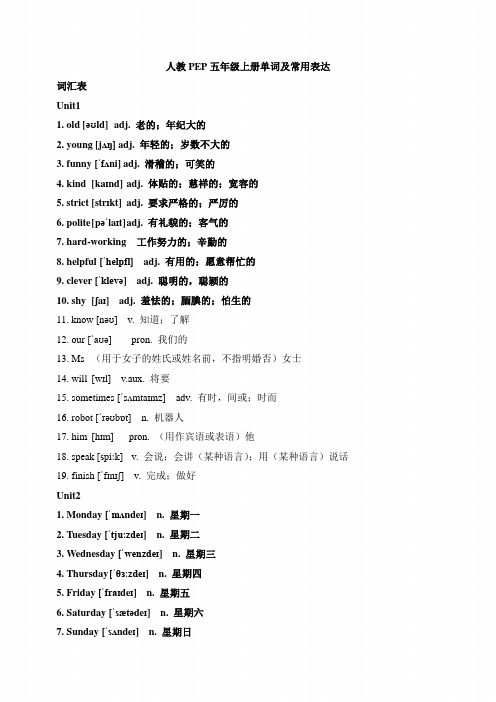
人教PEP五年级上册单词及常用表达词汇表Unit11. old [əʊld] adj. 老的;年纪大的2. young [jʌŋ] adj. 年轻的;岁数不大的3. funny [ˈfʌni] adj. 滑稽的;可笑的4. kind [kaɪnd] adj. 体贴的;慈祥的;宽容的5. strict [strɪkt] adj. 要求严格的;严厉的6. polite [pəˈlaɪt] a dj. 有礼貌的;客气的7. hard-working 工作努力的;辛勤的8. helpful [ˈhelpfl]adj. 有用的;愿意帮忙的9. clever [ˈklevə] adj. 聪明的,聪颖的10. shy [ʃaɪ] adj. 羞怯的;腼腆的;怕生的11. know [nəʊ] v. 知道;了解12. our [ˈaʊə] pron. 我们的13. Ms (用于女子的姓氏或姓名前,不指明婚否)女士14. will [wɪl] v.aux. 将要15. sometimes [ˈsʌmtaɪmz] adv. 有时,间或;时而16. robot [ˈrəʊbɒt] n. 机器人17. him [hɪm] pron. (用作宾语或表语)他18. speak [spiːk]v. 会说;会讲(某种语言);用(某种语言)说话19. finish [ˈfɪnɪʃ] v. 完成;做好Unit21. Monday [ˈmʌndeɪ] n. 星期一2. Tuesday [ˈtjuːzdeɪ] n. 星期二3. Wednesday [ˈwenzdeɪ] n. 星期三4. Thursday [ˈθɜːzdeɪ] n. 星期四5. Friday [ˈfraɪdeɪ] n. 星期五6. Saturday [ˈsætədeɪ] n. 星期六7. Sunday [ˈsʌndeɪ] n. 星期日8. weekend [ˌwiːkˈend]n. 周末9. wash [wɒʃ] v. 洗10. wash my clothes 洗我的衣服11. watch [wɒtʃ] v. 看12. watch TV 看电视13. do [du:] v. 做;干14. do homework 做作业15. read [riːd]v. 看;读16. read books 读书17. play [pleɪ] v. 踢;玩;参加(体育运动)18. play football 踢足球19. cooking [ˈkʊkɪŋ]n. 烹饪;烹调20. often [ˈɒfn] adv. 时常;常常21. park [pɑːk] n. 公园22. tired [ˈtaɪəd] adj. 疲倦的23. sport [spɔːt]n. 体育运动24. play sports 进行体育运动25. should [ʃʊd] modal v. 应当,应该26. every [ˈevri]det. 每一个,每个27. day [deɪ] n. 一天;一日28. schedule [ˈʃedjuːl]n. 工作计划;日程安排Unit31. sandwich [ˈsænwɪtʃ] n. 三明治2. salad [ˈsæləd] n. 蔬菜沙拉3. hamburger [ˈhæmbɜːɡə] n. 汉堡包4. ice cream 冰激凌5. tea [tiː] n. 茶;茶水;6. fresh [freʃ] adj. 新鲜的;刚摘的7. healthy [ˈhelθi]adj. 健康的8. delicious [dɪˈlɪʃəs] adj. 美味的,可口的9. hot [hɒt] adj. 辣的;辛辣的10. sweet [swiːt]adj. 含糖的;甜的11. drink [drɪŋk] vt.& vi.喝(酒);饮12. thirsty [ˈθɜːsti]adj. 渴的;口渴的13. favourite [ˈfeɪvərɪt] adj. 特别喜爱的14. food [fuːd]n. 食物15. Dear [dɪə] adj. (用于信开头某人的名字前)亲爱的16. onion [ˈʌnjən] n. 洋葱;葱头Unit41. sing [sɪŋ]v. 唱;唱歌2. song [sɒŋ]n. 歌曲3. sing English songs 唱英文歌曲4. play the pipa弹琵琶5. kung fu 功夫;武术6. do kung fu 练武术7. dance [dɑːns]v.&n. 跳舞8. draw [drɔː]v. 画9. cartoon [kɑːˈtuːn]n. 漫画10. draw cartoons 画漫画11. cook [kʊk] vi. 烹调;烹饪12. swim [swɪm] v. 游泳13. play basketball 打篮球14. ping-pong 兵兵球15. play ping-pong 打乒乓球16. speak English 说英语17. we’ll=we will 我们将要......18. party [ˈpɑːti]n. 聚会;派对19. next [nekst] adj. &n. 下一个(的);接下来(的)20. wonderful [ˈwʌndəfl] adj. 极好的;了不起的21. learn [lɜːn] v. 学习;学会22. any [ˈeni]adj. 任何的;任一的23. problem [ˈprɒbləm] n. 问题24. no problem 没问题25. want [wɒnt] v. 要;想要26. send [send] v. 邮寄;发送27. email ['iːmeɪl] n. 电子邮件28. at [ət; æt] prep. (后面接邮件地址)Unit51. clock [klɒk] n. 时钟;钟2. plant [plɑːnt] n. 植物3. bottle [ˈbɒtl] n. 瓶子4. water bottle 水瓶5. bike [baɪk] n. 自行车;脚踏车6. photo [ˈfəʊtəʊ] n. 照片,相片7. front [frʌnt] n. 正面8. in front of 在……前面9. between [bɪˈtwiːn] prep. 在……中间10. above [ə'bʌv] prep. 在……上面11. beside [bɪˈsaɪd] prep. 在旁边;在附近12. behind [bɪˈhaɪnd] prep.在……的后面13. there [ðeə] adv. 表示存在或发生14. grandparent ['grænpeərənt] n. 祖父(母),外祖父(母)15. their [ðeə] pron. 他们的,她们的;它们的16. house [haʊs] n. 房屋,房子,住宅17. lot [lɒt] n. 大量;许多18. lots of 大量;许多19. flower [ˈflaʊə] n. 花;花朵20. move [muːv]v. 搬家21. dirty [ˈdɜːti]adj. 肮脏的22. everywhere [ˈevriweə(r)] adv. 到处,处处23. mouse [maʊs] n. 老鼠24. live [lɪv] v. 住;居住25. nature [ˈneɪtʃə(r)] n.自然界;大自然Unit61. forest ['fɒrɪst] n. 森林;林区2. river [ˈrɪvə] n. 江,河3. lake [leɪk] n. 湖;湖泊4. mountain [ˈmaʊntən] n. 高山;山岳5. hill [hɪl] n. 山丘;小山6. tree [triː]n. 树;树木;乔木7. bridge [brɪdʒ] n. 桥8. building [ˈbɪldɪŋ]n. 建筑物;房子;楼房9. village [ˈvɪlɪdʒ] n. 村庄;村镇10. house [haʊs] n. 房子,房屋,住宅11. boating ['bəʊtɪŋ]n. 划船12. go boating 去划船13. aren’t = are not 不,不是14. rabbit [ˈræbɪt] n. 兔子15. high [haɪ] adj. 高的常用表达法:Unit1Is he young? 他年轻吗?No, he isn’t. 不,他不年轻。
- 1、下载文档前请自行甄别文档内容的完整性,平台不提供额外的编辑、内容补充、找答案等附加服务。
- 2、"仅部分预览"的文档,不可在线预览部分如存在完整性等问题,可反馈申请退款(可完整预览的文档不适用该条件!)。
- 3、如文档侵犯您的权益,请联系客服反馈,我们会尽快为您处理(人工客服工作时间:9:00-18:30)。
11PEP英语五年级上册学习内容Unit 1一、words:young (年轻的)funny (滑稽可笑的)tall (高的)strong (强壮的)kind (和蔼的;亲切的)old (年老的)short (矮的)thin (瘦的)Mr (先生)like (像;喜欢)strict (严格的)smart (聪明的;巧妙的)active (积极的;活跃的)quiet (安静的;文静的)very (很;非常)but (但是)二、sentences:1、Who's your English teacher?Mr Carter.2、What's he like?He's tall and strong.3、Is she quiet?No,she isn't.She's very active.4、Is she stict?Yes,she is,but she's very kind.5、I have three new teachers.6、Who are they?He's from Canada.7、Her class is so much fun.1.告诉朋友我有新换的老师:I have three new teachers. 我有三位新老师。
I have a new math teacher. 我有一位新数学老师。
2.询问陌生人:---Who are they? 他们是谁?---A science teacher, an art teacher and an English teacher.一位科学老师,一位美术老师和一位英语老师。
---Who’s that young lady? 那位年轻的女士是谁?---She’s our principal. 她是我们的校长。
3.询问任课教师是谁:---Who’s your art teacher? 你的美术老师是谁?---Mr Hu.胡先生。
---Who’s your math teacher? 你的数学老师是谁?---Mr Zhao. 赵先生。
--Who’s your English teacher? 你的英语老师是谁?---Mr Carter. 卡特先生。
---Who’s your principal? 你们的校长是谁?---Miss Lin. 林小姐。
4.询问任课教师的体貌特征及性格特点并作出回答:---What’s he like? 他长得什么样?---He’s tall and strong. 他长得又高又壮。
---He’s thin and short. He’s very kind. 他长得又瘦又矮。
他很和蔼可亲。
--- Is she quiet? 她很文静吗?--- No, she isn’t. She’s very active. 不,不是的。
她很活跃。
--Is she strict? 她很严格吗?--Yes, she is, but she’s very kind.是的,她是,但是她也很和蔼。
Unit 2一、words:Monday (星期一)Tuesday (星期二)Wednesday (星期三)Thursday (星期四)Friday (星期五)Saturday (星期六)Sunday (星期天)day (天;日子)have (有;吃)on (在…..时候)do homework (做作业)watch TV (看电视)read books (读书)二、sentences:1、What day is it today?It's Wednesday.2、What do you have on Thursdays?3、We have English,math and science on Thursdays.4、What do you do on Saturdays?5、I watch TV on Saturdays.6、What about you? I do my homework,too.7、Tomorrow is Thursday. That's great! 8、It's time to get up.That's right!1.询问今天星期几并回答:---What day is it today? 今天星期几?---It's Wednesday. 今天星期三。
2.询问星期几上什么课程并作出回答:---What do you have on Wednesdays? 你们星期三上什么课?---We have English, science, computer and P.E. 我们上英语、科学、计算机和体育课。
--- What do you have on Thursdays? 你们星期四上什么课?---We have English, math and science on Thursday. 我们星期四上英语、数学和科学课。
3.表达喜欢星期几及其原因:I like Wednesdays. 我喜欢星期三。
I like Mondays and Fridays. 我喜欢星期一和星期五。
We have P.E. class. 我们上体育课。
I like Tuesdays and Thursdays. 我喜欢星期二和星期四。
We have art class. 我们上美术课。
John likes Mondays and Fridays, because he likes P.E….约翰喜欢星期一和星期五,因为他喜欢体育……4.询问某人周末做什么:---What do you do on weekends? 你周末做什么?---I often watch TV, do homework and read books. 我经常看电视,做作业,还有读书。
---What do you do on Saturdays? 你星期六做什么?---I often do my homework, read books and watch TV. 我经常做作业、读书,还有看电视。
---I watch TV on Saturdays. 星期六我经常看电视。
---What do you do on Sundays? 你星期天做什么?--- I often play ping-pong. 我经常打乒乓球。
---What about you? 你呢?---I do my homework, too. 我也做我的家庭作业。
I do housework. 我做家务。
Unit 3一、words:eggplant (茄子)fish (鱼)green beans (青豆)tofu (豆腐)potato (土豆)tomato (西红柿)for (为;给)lunch (中餐;午饭)we (我们)tasty (好吃的)sweet (甜的)sour (酸的)fresh (新鲜的)salty (咸的)favourite (最喜爱的)they are (他们是)fruit (水果)grape (葡萄)二、sentences:1、What do you have for lunch on Mondays?2、We have tomatoes,tofu and fish,3、What's your favourite fruit?4、I like apples.They're sweet.5、I like fruit.But I don't like grapes.They're sour.6、What would you like for lunch?7、I'd like some tomatoes and mutton.8、I'm hungry.Here is our school menu.9、That sounds good. It's tasty.10、It's my favourite.11、What's your favourite food?12、Bananas are my favourite .13、I'm heavy now.14、I1. 我饿了:I’m hungry.2.询问某人想吃什么东西:---What would you like for lunch? 你午饭想吃什么?---I’d like some tomatoes and mutton. 我想吃些西红柿和羊肉。
---What would you like for dinner, Amy?艾美,晚饭你想吃什么?---I’d like potatoes and green beans. 我想吃土豆和青豆。
3.询问他人午饭吃什么:---What do you have for lunch today? 今天午饭你吃什么?---I have eggplant and tomatoes. 我吃茄子和西红柿。
---What about you? 你呢?---I have onions and green beans. 我吃洋葱和青豆。
---What do you have for lunch on Mondays? 你们星期一午饭吃什么?---We have tomatoes, tofu and fish. 我们吃西红柿、豆腐和鱼。
4.这儿是我们学校的菜单:Here is our school menu.5.那听起来很好:That sounds good.6.询问他人喜欢什么食物:---What’s your favorite food? 你喜爱的食物是什么? ---Fish. 鱼。
---What’s your favorite fruit? 你最喜爱的水果是什么?7.表述自己喜欢或不喜欢某种事物并阐述原因:I like apples. They're sweet.我喜欢苹果。
它们很甜。
I like fruits. But I don't like grapes. They're sour.我喜欢吃水果,但是我不喜欢葡萄。
它们是酸的。
8. 简单描述一些食物的味道:Bananas are my favorite. They’re tasty.香蕉是我的最爱。
它们很好吃。
I like carrot juice. It’s fresh and healthy. 我喜欢胡萝卜汁。
它很新鲜,也有益健康。
have to eat vegetables.Unit 4一、words:Cook the meals (倒垃圾)water the flowers (浇花)sweep the floor (扫地)clean the bedroom (打扫卧室)make the bed (铺床)set the table (摆饭桌)wash the clothes (洗碗碟)do the dishes (收拾衣服)use a computer (使用计算机)二、sentences:1、What can you do?I can sweep the floor.2、I can cook the meals.I can water the flowers.3、Can you make the bed?No,I can't.4、Can you use a computer?Yes,I can.5、I'm helpful.Are you helpful at home ?6、You're helpful.Mother Goat is ill.We can help her.Just do it!7、But I'd like to have a try!1.你在家能帮忙吗:Are you helpful at home?I’m helpful.我很有用。
